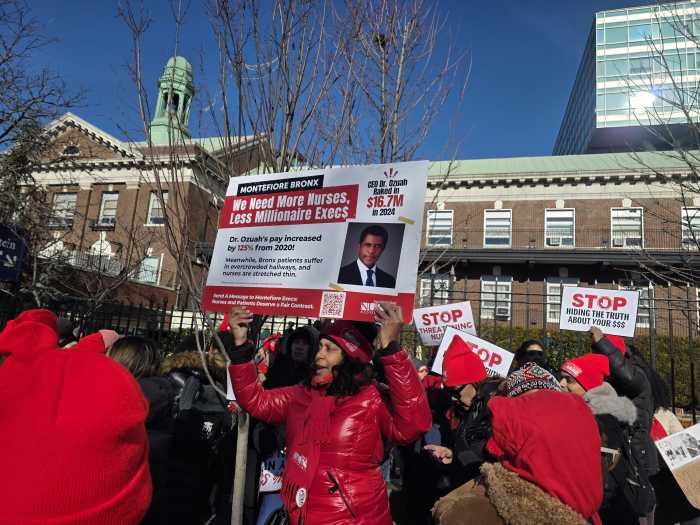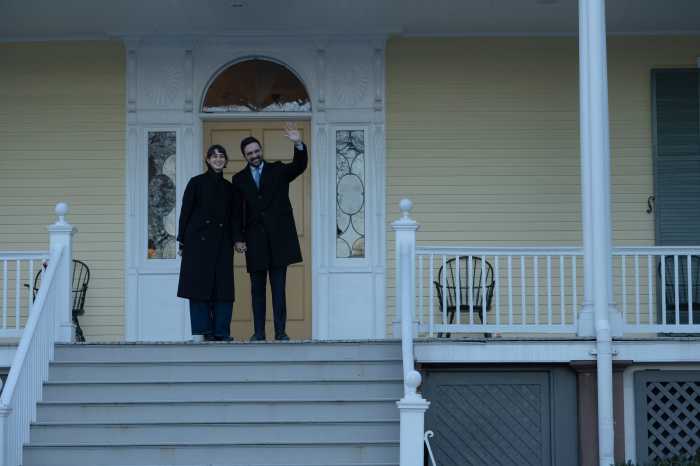Show Stoppers|White hot, Jason’s gold, gay doc matters
BY DAVID NOH
In the Noh: When Terri White walked out onstage in “Follies” and sang “Mirror, Mirror,” followed by a vicious tap routine, the show hit a white hot high point for me, which nothing else topped.
But then, White should be used to show-stealing — the opening night of the Encores!’ “Finian’s Rainbow,” after her sizzling rendition of “Necessity,” all you heard in the lobby was “Who is Terri White?” or “Where the hell has she been?”
This unquenchable powerhouse, accompanied by her wife and business manager, Donna Barnett (in classic black leather jacket and tie), described for me that splendid “Follies” moment: “I was in my element. I’ve been tapping since I was two years old. What kills me is when people say, ‘I never knew you tapped!’ Well, I tapped the entire time I did ‘The Club’ for Tommy Tune in 1975, ‘Barnum,’ and ‘Bubbling Brown Sugar,’ so it’s not like it’s a first.”
Her character, Stella, she said, is “me, in a sense. Especially when she says, ‘I’ve had hard times, taken my lumps. I see myself in the mirror, remembering those days I did hoof and struggle, hearing the crowd and being away for almost 30 years. And then, coming back. That feeling you can’t get any place else, when you get on that stage and give your all, looking out at the audience and thinking, “I remember this. Boy, I missed it!”’”
White uses her memory of the 2009 opening night of “Finian’s Rainbow,” which brought her back to Broadway after decades in the casting wilderness: “It’s my visual, envisioning that first night back, with the response, which is why I look around at the audience remembering that wonderful moment.”
During “Follies”’ run at the Kennedy Center in Washington, White said, she hadn’t heard a word from Stephen Sondheim, “and one night, he called almost all the leads in except me, and I thought, is this a good or bad thing? On opening night, he knocked on my door and said, ‘The reason why I didn’t give you any notes or call you in is because you’re perfect. I went, ‘Oh thank you, Steve Sondheim!’
“This is the first time Stella has danced the whole number. She always did the opening number, and when they got to ‘Mirror,’ the ghosts would do the dancing and everything else, until the last chorus when she sings again.”
The show is chockfull of divas, and White said, “It scared me, the list there goes on and on, and I wondered, ‘Can I keep up with these people and will there be a lot of diva stuff going on during rehearsals?’ Not at all — from day one, everyone was working hard, two and a half hours of tap rehearsals every day with women who range from 57 to 75 in age. We call it ‘The Show of the Walking Wounded,’ with people’s bodies going out all over the place.
“Bernadette Peters is so much fun. We mess with each other constantly on stage, during the little party scenes, sometimes we’re in character, sometimes talk about what we just flubbed, ‘Okay, it’s a Wednesday matinee, keep moving.’ We don’t say, ‘Peas and carrots’ [for pretend dialogue] we go, ‘Rutabaga, rutabaga.’”
Every night after the show, White meets people who remember her from her years of Village bartending: “I make a great martini and did piano bars for over 40 years — Rose’s Turn, 88s, Five Oaks, Don’t Tell Mama. I haven’t been down there since Rose’s Turn closed and was devastated because I worked in that building for almost three decades, when it was Bon Soir, Upstairs at the Downstairs, the old Duplex. So, to see it totally ripped out and made into a real estate office. Really?
“I was at Don’t Tell Mama last night. I only have one and a half numbers in the show, so will get to feeling what I call a quart low. I need to sing. In the piano bars you did between 20 and 26 tunes, and that’s what built up these iron cords over the years to hit the back of the house.”
White’s vocal preparation consists of a cigarette and an Altoid: “That’s it. Done! In the 1970s, I went to a voice teacher, $75 an hour then, and he said, after I sang for him, ‘How do you do that?’ I said, ‘I have not a clue, and I came to learn from you so I guess the class is over,’ and left. Leontyne Price told me a teacher would only ruin me and that I have one thing that most opera singers work their entire lives for. I was a bassoonist and I use my back diaphragm for that support, especially when you’re tap dancing for eight minutes and have to come in at the end.
“The only thing that really bothered me during those years of bartending was when people said, ‘You should be on Broadway.’ Been there! Want to, and it’s not like I stopped auditioning. It was a rough 20 years. I was blacklisted during ‘Barnum,’ and was basically run out of town and told you’ll never work here again.’ It was for being a lesbian, and a lot of them were gay themselves, but they were married to cover their asses, so I pretty much was the scapegoat.
“I’m really proud that my wife convinced me coming back for ‘Finian’s,’ because I was scared and thought I can’t come back on Broadway and be out. I’ll get blacklisted again and go through the same thing. My wife convinced me that times had changed.”
Things can still be difficult, though: “Yes, it still goes on, and the scariest thing is I know so many closeted lesbians. It’s a little easier for the guys. That has always been a lot more acceptable, because the casting couch would be very empty without the lesbians, if they all came out. Whatever comes out of this, I know that I’ve done what I can do to be a part of the community, representing the lesbians in the business. If you don’t like it, too bad. It has nothing to do with what I do on stage. Every day, someone asks for my autograph and thanks us for being public about it.”
White did ‘Nunsense’ with Rue McLanahan: “We hit it off immediately. She did not know I was homeless at the time. I never said anything. But we had our Sunday Bitch Brunch, where spouses were not allowed, and ate bagels and cream cheese and everything else she wasn’t supposed to be eating, just get it all out of our systems. That was when she was writing ‘My First Five Husbands,’ almost first six during that time — she was just on the verge.
“I sang at her wedding and called to tell her, ‘I’m with someone.’ She asked, ‘Who is it?,’ and because she could hear Donna’s voice in the background, which is so deep, ‘You’re with a man?!’ ‘No, no, calm down, dear. Don’t worry. Nothing’s changed.’ ‘Well, put her on the phone!’”
Barnett broke in to say, “She said, ‘I just have one question. Did you vote for Obama? I said I did, and she said, ‘You’re okay, and if you hurt her, I’ll kill you!’ I’ve lived in Key West for 26 years and met Terri at her piano bar. I had friends who wanted me to see her, and had to be dragged kicking and screaming because I had to be at work in the morning and had already been out at a different bar and needed to go home. That was it. We haven’t been apart since. It’s going to be three years next week.”
I pity anyone who missed Jason Graae’s show, “Perfect Hermany,” which just wrapped at the Laurie Beechman Theater. Opening night saw most of New York’s cabaret cognoscenti, including the divine Marilyn Maye, exulting in his total mastery of the form. The show was a salute to composer Jerry Herman, who turns 80 this year and hasn’t enjoyed a fraction of the still extant idolatry dumped on Sondheim for reaching the same milestone.
Graae performed with sparkling, ad-lib-filled wit, joy, and consummate professionalism that included high notes that can only be described as honeyed. He recently revived “The Grand Tour,” Herman’s musical adaptation of Franz Werfel’s “Jacobowsky and the Colonel,” and his irresistibly lovely rendition of “Mrs. S.L. Jacobowsky” turned the bare Beechman stage into a small portion of theatrical heaven.
Graae’s show is thankfully preserved on his CD of the same name from Kritzerland (kritzerland.com/graae.htm), and he told me, “After doing ‘The Grand Tour,’ I thought, ‘Darn it! I have a lot of Jerry Herman stories and I wanna keep singing these songs and just love him so much.’ His spirit is so completely contagious when you’re working with him he just raises your game. He gave me this note about singing ‘It Only Takes a Moment,’ which is this life lesson song about falling in love and meeting somebody, but at the end with ‘It only took a moment,’ it changes for the singer and becomes something that really happened to me, so Jerry said, ‘Take a breath after “took,”’ and that changes the meaning as the song changes gear.
“The first time I ever worked with him, I was so nervous because you’re in the presence of legendary greatness. I literally thought I was going to pee in the rehearsal room. But he was so generous and complimentary that you never feel intimated by him. Sondheim, I’ve only been in the same room with him once, and I did pee on the floor. He was quite amazed. [Laughs.] And, while Jerry’s music may not be sexy in a Kander and Ebb kind of way, I think it’s sexy in its accessibility, and he himself is very sexy, one of the most wickedly naughty, hilarious people with an incredible campy sense of humor, nothing of which I can repeat here.”
We need to have Graae back on Broadway desperately. On that score, he explained, “I came out to Los Angeles to do ‘Forbidden Hollywood’ and just stayed. I didn’t mean to move, but I got evicted from my New York apartment, and it became harder to get back. It’s not easy. On Broadway, you’re a little out of sight, out of mind. If you’re not there to do an audition or workshop the next day, they’ll find someone who is. But I would love to come back.
“I did ‘Ragtime,’ and kids that are in the business now say, ‘So you played the Houdini track?’ They call it that now, and it’s like a factory assembly line. ‘No, it’s not the track, it’s the role of Houdini!’ ‘Oh, we call them tracks now!,’ and this and that and ay yi yi!”
Graae lives in what he refers to as the “labia of Hollywood — right across the street from Lake Hollywood, have a house, a partner, a dog, and an 88-year-old mother who is now in assisted living down the way. It’s very suburban. I lived in New York for 15 years on the Upper West Side and was the complete neurotic musical theater actor talking about nothing but the business and auditions. The fact that I’m out here for 13 years is just astonishing.
“My partner is Glenn Fretwell, a landscape designer. We’ve been together two weeks, really great, he seems like a keeper and moved right in. We met at the gym where I saw him on the pec deck and thought this is it! No, really, we’ve been together for 12 years. All my New York relationships were so dramatic, and this has been so easy. I guess it comes with age or I’ve mellowed out here. I’m sure I was the more dramatic one in New York.
“We are domestic partners, and I was so happy when you guys passed it in New York, although I wanted it to be in LA first. I saw all those pictures of people celebrating and thought, ‘Ohmigod, in the ‘80s there was such sadness and huge depression and to see everybody out there in the bars — I was actually sobbing. I was working this summer with these young chorus boys, and we were doing a toast of what we’re all grateful for at this dinner party. I said, ‘I’m grateful for all my friends who are living who were given a death sentence in ‘80s and are now surviving,’ and everybody stared at me. It was so foreign to them and they stared at me like I was nuts, and I thought, ‘Ohmigod, people really don’t have a concept of what went on.’
“I spent most of the ‘80s in the closet. It took me so long to come out, so I was a late bloomer when I moved to New York in the ’80s and was experimenting, but hadn’t really found my way in. I’ll never forget, I read in New York magazine about the first AIDS cases and this man looking down on a red dot on his forearm, and that was the beginning. I saw a red dot on my forehead and thought, ‘Oh that’s it, I have it,’ and went on Ninth Avenue and collapsed on the street. So dramatic, but everybody was panicked back then.”
A highlight of Graae’s New York years was the Rodgers and Hart show he did at Rainbow and Stars with Elaine Stritch: “She was a pisser to work with but a nightmare during rehearsals. Margaret Whiting was so easygoing and sweet, and Elaine was such a perfectionist and exacting. She fired the first director we had, and she was a bit of a bully during rehearsals and everybody held their own. I remember Judy Kuhn and I were singing ‘There’s a Small Hotel,’ and Elaine walked right in front of us in the rehearsal room wearing her bra and pantyhose and she was going to shoot up for her diabetes, an insane moment.
“Once we opened and got these incredible reviews, she became one of the top three most generous performers I’ve ever worked with, so giving onstage about passing it over to you when it was your moment. Everybody from Sondheim to Hal Prince and Comden and Green came opening night.
“Elaine sent over a note about the order of our numbers to all of us, which said Judy and I should do all our numbers before Elaine even walked out onstage. Margaret had the big 11 o’clock number, ‘Bewitched,’ which Elaine moved up four songs and it became all about Elaine. Judy and I said, ‘Ohmigod, all the theater queens will be so sick of us. They’ve all come to see Elaine and we will be on our seventh song. Don’t make us do it.’ We ended up having a very good order and it was a great show, but my God, you don’t want to follow her. Just be her warm-up act and then run!”
I liked “Paul Goodman Changed My Life” a lot more than our film critic Gary Kramer, and think this incisive, passionate account of a kaleidoscopic genius should be screened for all those Wall Street Occupiers, who, as of this printing, seem to have less direction than admirable determination. A pity Goodman isn’t alive to tell them a thing or three about what to do — and think.
I especially liked filmmaker Jonathan Lee’s balanced approach to Goodman, self-involved warts and all exposed as well as his visionary brilliance. This film was rejected by every festival, Lee told me at his opening night party at his mother’s Nancy Margolis Gallery in Chelsea on October 19, before being accepted by Film Forum (209 W. Houston St., filmforum.org) and thereby happily bypassing any cinematic auditions.
“Paul Goodman” stands in contrast to HBO’s “Vito,” directed by Jeffrey Schwarz, which practically sanctifies Vito Russo, activist and author of the seminal book “The Celluloid Closet.” Undoubtedly a brave voice in our community whose achievements are unquestioned, Russo could often be a handful. Full disclosure: when he was researching his book, I helped him find photos while working for Movie Star News’ Paula Klaw, whom some may remember as the woman who tied up Bettie Page for bondage sessions photographed by her brother Irving. I even prevailed on Klaw to give Russo a price break for his images and was rewarded with an acknowledgment in the book. Funny thing was that my name was missing from the second edition, but the same photos were all there.
I remember when he was alive the very mention of Russo’s name would often cause rolled eyes and far worse, as he was known to be particularly abrasive if one’s views differed from his even fractionally. During the Film Festival showing of “Vito,” when someone onscreen extolled him as “everyone’s gay hero,” film scholar Elliott Stein loudly declared, “Not mine!” Stein said when he was working at MoMA, certain films Russo screened for his research would be returned missing whole gay-related segments.
Just sayin’.
Contact David Noh at Inthenoh@aol.com and check out his new blog at http://nohway.wordpress.com.
































